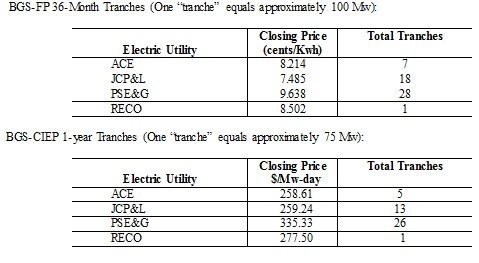
BGS Auction Results Provide for Stable Electricity Prices
On Feb 11, 2016The New Jersey Board of Public Utilities (Board) today approved the results of the State’s 15th annual electricity auction for Basic Generation Service (BGS), which resulted in an overall tranche-weighted average winning price decrease of 4.3 percent as compared to last year’s auction. Winning prices for each of the four regulated Electric Distribution Companies (EDCs) decreased between 3 percent and 7 percent over last year’s auction.
The impact of the auction results on ratepayer bills, however, will be offset by capacity cost increases resulting from actions taken by PJM under the Federal Energy Regulatory Commission (FERC) approved Capacity Performance construct. Without PJM’s Capacity Performance construct, the estimated change in monthly bills would have ranged from a decrease of 3.4 percent to an increase of 1.3 percent.
“Once again, for an eighth year in a row, many residents and small- to medium-sized businesses will see stable electricity prices resulting from New Jersey’s competitive electricity supply auction,” said Richard S. Mroz, president, N.J. Board of Public Utilities. “While the auction results have benefited ratepayers with lower prices over the course of the Christie Administration, the Board predicted that PJM’s Capacity Performance construct would increase capacity costs and aggressively advocated before FERC and PJM in an effort to continue to drive down energy prices to improve the State’s economic competitiveness.” The Board’s rehearing request is still pending before FERC.
As a result of PJM’s Capacity Performance construct, average residential estimated bills for all four EDCs will increase by about $2 per month. With the lower auction prices and the capacity cost increases factored in, ratepayers served by Jersey Central Power and Light (JCP&L) will see an average estimated bill decrease of 1.2 percent. Ratepayers served by Atlantic City Electric (ACE) and Rockland Electric Company (RECO) will see average estimated bill increases of 1.14 percent and 0.7 percent, respectively. Those ratepayers supplied by Public Service Electric & Gas (PSE&G) will see an average estimated bill increase of 3.5 percent.
The following table illustrates how the auction results, with the increased capacity costs, will affect electricity supply costs for the average residential customer when the new rates take effect on June 1, 2016:
The BGS auction determines, in part, the cost of electricity for most New Jersey residents and many businesses for the twelve-month period starting June 1, 2016. The Board’s approval of the BGS results covers two separate descending clock auctions conducted by NERA Economic Consulting beginning February 5 and ending February 9. The auction for Commercial and Industrial Energy Price (CIEP) service used by large commercial and industrial customers began on February 5 and concluded on February 8. The auction for Residential Small Commercial Pricing (RSCP) service used primarily by residential and small- to medium-sized commercial customers began on February 8 and concluded on February 9. Both auctions secured commitments for up to approximately $6 billion worth of purchases covering approximately 8400 megawatts (MWs) of customer requirements.
The energy secured in the RSCP auction will meet one third of the state’s residential and small business electric load requirements for the next three energy years, starting June 1, 2016. The remaining two-thirds of customer supply requirements for the 12-month time period beginning June 1, will be met by electric supply secured in the BGS Auctions of 2014 and 2015. The supply acquired through the CIEP auction is for one year. The state’s four regulated electric distribution companies do not earn a profit on the cost of the electric supply secured in the auctions. These costs are passed through directly to ratepayers.
For CIEP ratepayers the prices remain essentially stable for three of the four EDCs, while the winning price for PSE&G is higher compared to last year. The CIEP price is primarily driven by the cost of electric generating capacity from PJM’s Base Residual Auction and the cost of meeting the State Renewable Portfolio Standard (RPS). Capacity prices for PSE&G increased this year, while capacity prices for the three EDCs remained stable. The CIEP price constitutes only a small portion of monthly bills of CIEP customers for the period from June 1, 2016 to May 31, 2017; the price of other components has remained fairly stable.
The CIEP product is a full requirement product for which the Board bids out certain components and relies on spot prices for energy. As of December 2014, approximately 86 percent of the CIEP load is being provided through individual contracts with third-party suppliers. These contracts are negotiated in the competitive marketplace and are not affected by the CIEP auction results.
“The auction was competitive throughout the bidding process based upon the number of bidders, the number of offerings for each block of power auctioned, and the competitive prices that resulted,” said Mroz. “I want to thank the bidders for participating in this auction leading to competitive prices for New Jersey ratepayers.”
The winning bidders of the Fixed Price (FP) Auction are:
- BP Energy Company
- BTG Pactual Commodities (US) LLC
- Calpine Energy Services LP
- DTE Energy Trading, Inc.
- Exelon Generation Company, LLC
- Macquarie Energy LLC
- NextEra Energy Power Marketing, LLC
- PSEG Energy Resources & Trade LLC
- Talen Energy Marketing LLC
- TransCanada Power Marketing Ltd.
The BGS-CIEP Auction winners are:
- BTG Pactual Commodities (US) LLC
- ConocoPhillips Company
- DTE Energy Trading, Inc.
- Exelon Generation Company, LLC
- NextEra Energy Power Marketing, LLC
- PSEG Energy Resources & Trade LLC








